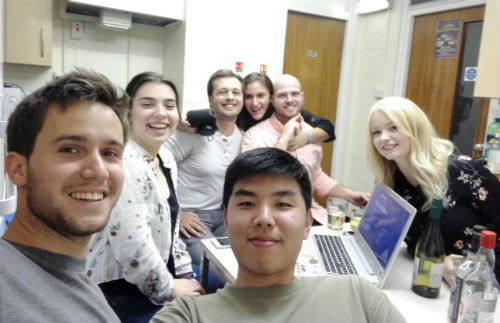
If anyone has an interest in an international exchange student program (ESP), here are some things you need to consider when choosing lectures. Before starting the main story, the tips I will give you are based on my experience as an exchange student for one semester at Northumbria University (NU) in the UK. Since many things depend on each person and each university, it is better for you to take only the things that will be helpful for you.
When you try to choose lectures, one of the most important things to think about is the reason why you want to go abroad and study. For example, if you want to meet many foreigners and make foreign friends, choosing hard lectures or many lectures does not help. In my case, my major is business administration and my minor is computer science. I want to be a professional programmer. Therefore, I wanted to see how foreign students study programming and how well they make a program. This reason gave me a timetable that was full of hard lectures. As a result, I studied a lot during my last semester at Northumbria. In summary, you need to consider your purpose for ESP when you register for lectures.
The second thing you need to consider is the credits for your graduation. Since ESP is a regular semester, you can have 18 credits for one semester, just like studying at CNU. However, the acknowledgement of your credit in the program is different from what you know. What surprised me was that many lectures give six credits per lecture in the UK. Therefore, I took three lectures that were six credits each. However, after finishing ESP, I only obtained 15 credits at CNU for ESP lectures. The reason is that I wanted one of my lectures to be acknowledged as six minor credits, but CNU professors checked the equivalent lecture at CNU, and there were no six credit lectures. Consequently, I took three credits for that lecture. Considering your graduation, you should consider how many credits you could actually get.
The last one is the assessment of your grade. The assessment system for exchange students at NU is different from the system at CNU. Most of the lectures at CNU consist of having a test related to what you study and submitting a small report. However, all the lectures that I took at NU required me to submit only a report, which made me use all the things that I studied in the lecture. The average time it took me to finish a report for a lecture was one month. It was quite long and tough. The average grade in the UK, which I heard about from my British friends, is about C or D when the grade in British universities is converted to the grade in Korean universities. However, you do not need to worry about the grade in the ESP, because, since 2017, the grade you obtain in the program will not be included in your grade at CNU except for the credit. Therefore, because the assessment system is different, you need to consider it when you choose your lectures. It can affect your exchange student life.
By Lee Chan-haeng, Senior, Faculty of Business Administration

